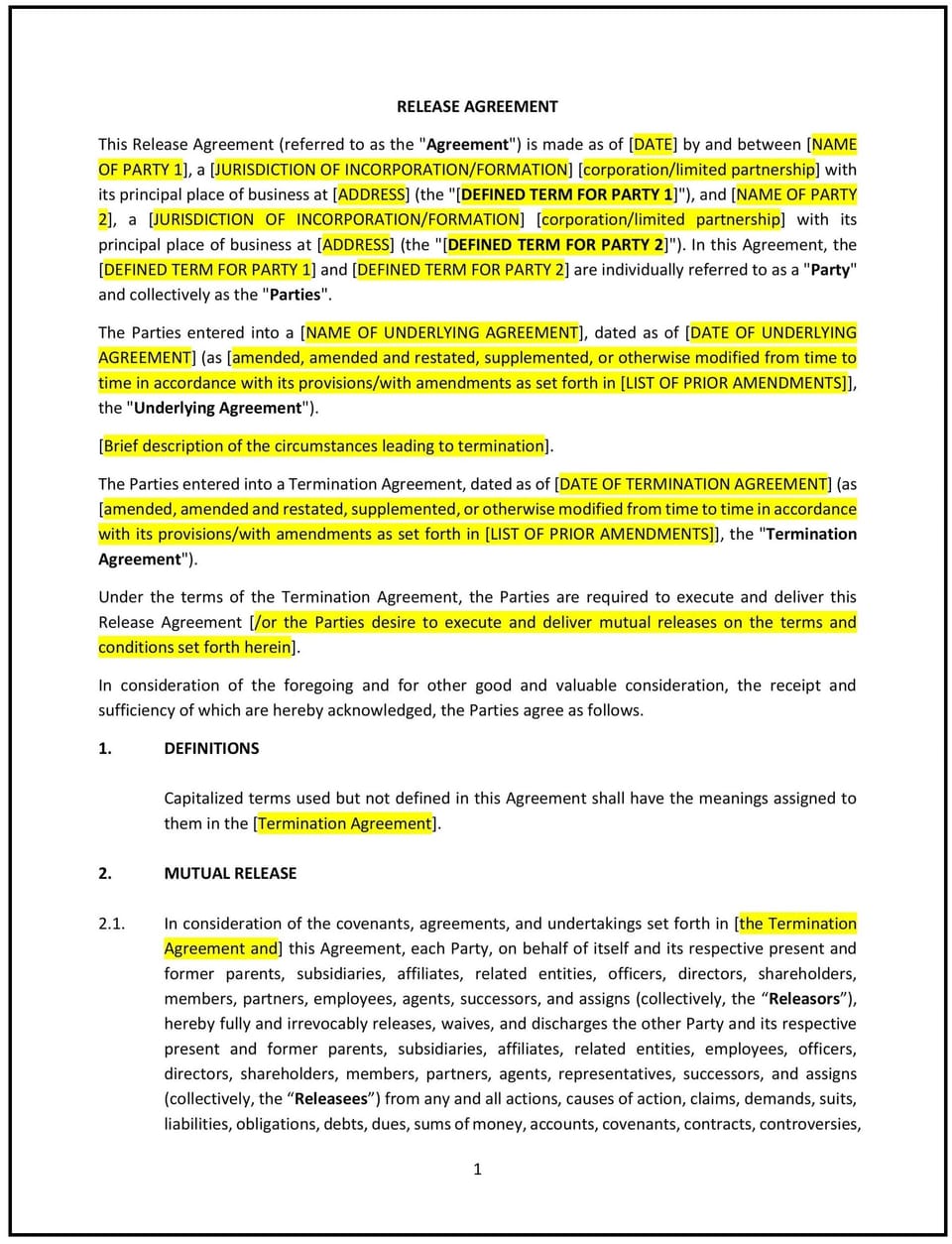Release Agreement (Mutual) (Ohio): Free template

Release Agreement (Mutual) (Ohio)
A Release Agreement (Mutual) is a legal document in which two or more parties agree to release each other from liability related to specific actions, events, or transactions. In Ohio, these agreements are governed by state contract laws and must align with federal regulations regarding fairness and enforceability. A well-drafted mutual release agreement clarifies the terms of the release, protects all parties involved, and aligns with Ohio’s legal standards.
For example, a Columbus-based partnership might use a mutual release agreement to resolve disputes and dissolve their business relationship amicably. A clear Release Agreement (Mutual) helps define the scope of the release and minimizes the risk of future conflicts.
Tips for drafting and maintaining a Release Agreement (Mutual) in Ohio
- Identify the parties involved: Clearly specify the names, addresses, and roles of all parties entering into the agreement.
- Example: “This Release Agreement (Mutual) is entered into by [Party A Name], located at [Address], and [Party B Name], residing at [Address].”
- Define the purpose of the release: Describe the reason for the agreement and the specific claims or liabilities being released.
- Example: “The purpose of this agreement is to mutually release and discharge any and all claims, demands, or liabilities arising out of [specific event, transaction, or relationship].”
- Specify the scope of the release: Clarify what is being released, including known and unknown claims.
- Example: “Each party hereby releases the other from any and all claims, whether known or unknown, related to [specific matter].”
- Outline permitted exceptions (if applicable): Specify any claims or liabilities that are excluded from the release.
- Example: “This release does not apply to claims related to [specific exclusions, such as ongoing obligations or future disputes].”
- Include confidentiality clauses (if applicable): Protect sensitive information shared during the process.
- Example: “The parties agree to keep the terms of this agreement and any related discussions confidential.”
- Address compensation or consideration (if any): State whether any payment, benefits, or other forms of consideration are involved.
- Example: “In consideration of this mutual release, [Party A] agrees to pay [Party B] the sum of [amount] within [timeframe].”
- Include termination terms (if applicable): Specify conditions under which the agreement may be terminated or modified.
- Example: “This agreement may only be amended or terminated in writing, signed by all parties.”
- Outline governing law and jurisdiction: Ensure the agreement specifies that it aligns with Ohio law and identifies the appropriate courts for dispute resolution.
- Example: “This agreement aligns with the laws of the State of Ohio. Any disputes arising under this agreement shall be resolved in the courts of [County], Ohio.”
- Include signatures: All parties must sign and date the agreement to make it legally binding.
- Example: “IN WITNESS WHEREOF, the parties have executed this Release Agreement (Mutual) as of the date first written above.”
Frequently asked questions (FAQs)
Q: Can a mutual release agreement in Ohio waive rights to file a lawsuit?
A: Yes, but only for claims explicitly covered in the agreement. Certain statutory rights, such as those under labor or discrimination laws, may not be waived.
Q: Are mutual release agreements subject to special requirements in Ohio?
A: Yes, Ohio has specific rules regarding the enforceability of releases, particularly for employment-related claims. Legal advice is often recommended to ensure compliance.
Q: What happens if one party breaches a mutual release agreement in Ohio?
A: The non-breaching party may seek remedies such as damages or specific performance through the courts, provided the agreement is valid and enforceable.
Q: Can a mutual release agreement in Ohio include provisions for attorney’s fees?
A: Yes, the agreement can include clauses specifying that the prevailing party in a dispute is entitled to recover attorney’s fees and costs.
Q: Is notarization required for mutual release agreements in Ohio?
A: Notarization is not required but can add an extra layer of authenticity and may be beneficial in certain situations.
This article contains general legal information and does not contain legal advice. Cobrief is not a law firm or a substitute for an attorney or law firm. The law is complex and changes often. For legal advice, please ask a lawyer.


